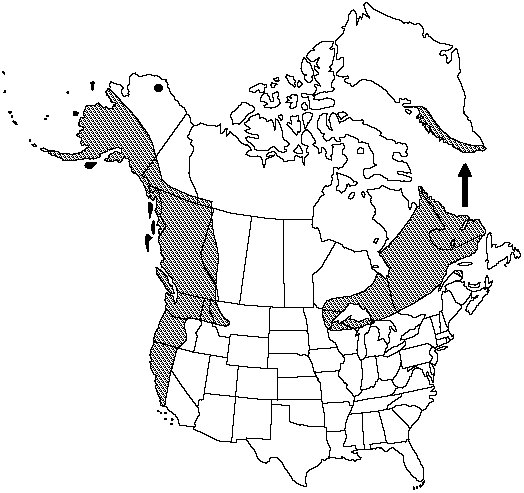Difference between revisions of "Dryopteris expansa"
Brit. Fern Gaz. 11: 338. 1977.
FNA>Volume Importer |
GeoffLevin (talk | contribs) m (Fixed Nfld. and Labr. distribution to match printed version.) |
||
| (8 intermediate revisions by 2 users not shown) | |||
| Line 8: | Line 8: | ||
}} | }} | ||
|common_names=Northern wood fern;spreading wood fern;dryoptère dressée | |common_names=Northern wood fern;spreading wood fern;dryoptère dressée | ||
| − | |basionyms={{Treatment/ID/ | + | |basionyms={{Treatment/ID/Basionym |
|name=Nephrodium expansum | |name=Nephrodium expansum | ||
|authority=C. Presl | |authority=C. Presl | ||
| + | |rank=species | ||
| + | |publication_title=Reliq. Haenk. | ||
| + | |publication_place=1: 38. 1825 | ||
}} | }} | ||
|synonyms={{Treatment/ID/Synonym | |synonyms={{Treatment/ID/Synonym | ||
|name=Dryopteris assimilis | |name=Dryopteris assimilis | ||
|authority=S. Walker | |authority=S. Walker | ||
| − | }}{{Treatment/ID/Synonym | + | |rank=species |
| + | }} {{Treatment/ID/Synonym | ||
|name=Dryopteris dilatata subsp. americana | |name=Dryopteris dilatata subsp. americana | ||
|authority=(Fischer) Hultén | |authority=(Fischer) Hultén | ||
| + | |rank=subspecies | ||
}} | }} | ||
|hierarchy=Dryopteridaceae;Dryopteris;Dryopteris expansa | |hierarchy=Dryopteridaceae;Dryopteris;Dryopteris expansa | ||
| Line 26: | Line 31: | ||
}}<!-- | }}<!-- | ||
| − | --><span class="statement" id="st- | + | --><span class="statement" id="st-undefined" data-properties=""><b>Leaves </b>monomorphic, tardily dying back in winter, to 90 × 30 cm. <b>Petiole</b> 1/3 length of leaf, scaly at least at base; scales scattered, brown with dark brown stripe. <b>Blade</b> green, deltate-ovate, 3-pinnate-pinnatifid, herbaceous, usually not glandular, occasionally finely and densely glandular. <b>Pinnae</b> ± in plane of blade, lanceolate-oblong; basal pinnae deltate, slightly reduced, basal pinnules equal to or longer than adjacent pinnules, basal basiscopic pinnule longer than basal acroscopic pinnule; pinnule margins serrate. <b>Sori</b> midway between midvein and margin of segments. <b>Indusia</b> lacking glands or sparsely glandular. <b>2n</b> = 82.</span><!-- |
-->{{Treatment/Body | -->{{Treatment/Body | ||
|habitat=Cool moist woods and rocky slopes | |habitat=Cool moist woods and rocky slopes | ||
|elevation=50–1500 m | |elevation=50–1500 m | ||
| − | |distribution=Greenland;Alta.;B.C.;Nfld.;N.W.T.;Ont.;Que.;Yukon;Alaska;Calif.;Idaho;Mich.;Minn.;Mont.;Oreg.;Wash.;Wis.;Wyo.;Europe. | + | |distribution=Greenland;Alta.;B.C.;Nfld. and Labr. (Labr.);N.W.T.;Ont.;Que.;Yukon;Alaska;Calif.;Idaho;Mich.;Minn.;Mont.;Oreg.;Wash.;Wis.;Wyo.;Europe. |
| − | |discussion=<p>Dryopteris expansa is diploid and is one of the parents of D. campyloptera. Where their ranges overlap in eastern Canada, these two species are very difficult to distinguish except by chromosome number. The growth habit (D. expansa leaves are more erect) is useful in the field. Three hybrids involving D. expansa are known; all are very rare.</p> | + | |discussion=<p><i>Dryopteris expansa</i> is diploid and is one of the parents of <i>D. campyloptera</i>. Where their ranges overlap in eastern Canada, these two species are very difficult to distinguish except by chromosome number. The growth habit (<i>D. expansa</i> leaves are more erect) is useful in the field. Three hybrids involving <i>D. expansa</i> are known; all are very rare.</p> |
|tables= | |tables= | ||
|references= | |references= | ||
| Line 41: | Line 46: | ||
-->{{#Taxon: | -->{{#Taxon: | ||
name=Dryopteris expansa | name=Dryopteris expansa | ||
| − | |||
|authority=(C. Presl) Fraser Jenkins & Jermy | |authority=(C. Presl) Fraser Jenkins & Jermy | ||
|rank=species | |rank=species | ||
| Line 50: | Line 54: | ||
|habitat=Cool moist woods and rocky slopes | |habitat=Cool moist woods and rocky slopes | ||
|elevation=50–1500 m | |elevation=50–1500 m | ||
| − | |distribution=Greenland;Alta.;B.C.;Nfld.;N.W.T.;Ont.;Que.;Yukon;Alaska;Calif.;Idaho;Mich.;Minn.;Mont.;Oreg.;Wash.;Wis.;Wyo.;Europe. | + | |distribution=Greenland;Alta.;B.C.;Nfld. and Labr. (Labr.);N.W.T.;Ont.;Que.;Yukon;Alaska;Calif.;Idaho;Mich.;Minn.;Mont.;Oreg.;Wash.;Wis.;Wyo.;Europe. |
|reference=None | |reference=None | ||
|publication title=Brit. Fern Gaz. | |publication title=Brit. Fern Gaz. | ||
|publication year=1977 | |publication year=1977 | ||
|special status= | |special status= | ||
| − | |source xml=https:// | + | |source xml=https://bitbucket.org/aafc-mbb/fna-data-curation/src/2e0870ddd59836b60bcf96646a41e87ea5a5943a/coarse_grained_fna_xml/V2/V2_405.xml |
|genus=Dryopteris | |genus=Dryopteris | ||
|species=Dryopteris expansa | |species=Dryopteris expansa | ||
| − | |||
| − | |||
| − | |||
| − | |||
| − | |||
| − | |||
| − | |||
| − | |||
| − | |||
| − | |||
| − | |||
| − | |||
| − | |||
| − | |||
| − | |||
| − | |||
| − | |||
| − | |||
| − | |||
| − | |||
| − | |||
| − | |||
| − | |||
| − | |||
| − | |||
| − | |||
}}<!-- | }}<!-- | ||
-->[[Category:Treatment]][[Category:Dryopteris]] | -->[[Category:Treatment]][[Category:Dryopteris]] | ||
Latest revision as of 23:20, 20 February 2024
Leaves monomorphic, tardily dying back in winter, to 90 × 30 cm. Petiole 1/3 length of leaf, scaly at least at base; scales scattered, brown with dark brown stripe. Blade green, deltate-ovate, 3-pinnate-pinnatifid, herbaceous, usually not glandular, occasionally finely and densely glandular. Pinnae ± in plane of blade, lanceolate-oblong; basal pinnae deltate, slightly reduced, basal pinnules equal to or longer than adjacent pinnules, basal basiscopic pinnule longer than basal acroscopic pinnule; pinnule margins serrate. Sori midway between midvein and margin of segments. Indusia lacking glands or sparsely glandular. 2n = 82.
Habitat: Cool moist woods and rocky slopes
Elevation: 50–1500 m
Distribution

Greenland, Alta., B.C., Nfld. and Labr. (Labr.), N.W.T., Ont., Que., Yukon, Alaska, Calif., Idaho, Mich., Minn., Mont., Oreg., Wash., Wis., Wyo., Europe.
Discussion
Dryopteris expansa is diploid and is one of the parents of D. campyloptera. Where their ranges overlap in eastern Canada, these two species are very difficult to distinguish except by chromosome number. The growth habit (D. expansa leaves are more erect) is useful in the field. Three hybrids involving D. expansa are known; all are very rare.
Selected References
None.